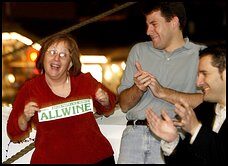Minor Party Fields Its Largest Slate in Md.
For most candidates, news that you’re at 1 percent in the polls is humiliating, especially when it’s used as justification to keep you out of a debate.
Then again, most candidates for the U.S. Senate don’t hold fundraisers featuring “tribal fusion belly dancing” or boast of their arrests at peace rallies.
| To Maria Allwine, Maryland’s Green Party candidate for the Senate, the 1 percent she drew in a recent League of Women Voters poll meant about 28,000 votes, or more than four times the number registered with the party. “I would be very happy if I ended up with 1 percent,” she said. |
|
That Allwine even knows her poll numbers is a boost for the party, which is fielding its largest slate of candidates in Maryland, thanks to a 2003 court ruling that eased access to the ballot. In years past, the league hasn’t always bothered to include the Greens in its polls.
This year, 15 Green Party candidates — seven for Congress, eight for Baltimore City Council — are carrying the party’s banner of environmentalism, social justice and nonviolence.
The Greens offer a different perspective from Republicans and Democrats on a variety of issues. Their national platform calls for the legalization of gay marriage, monetary compensation for the descendants of slaves, stronger prosecution of polluters, and permanent border passes for Canadian and Mexican citizens whose identities can be verified.
The party’s presidential candidate, David Cobb, who was arrested for civil disobedience after not being allowed to participate in the debates, has called for the minimum wage to be nearly doubled, to $10 an hour.
The party is still at the far margins of national and state politics. In Maryland, Democrats remain the dominant party with 1.6 million registered voters as of July. Republicans had about 850,000.
The Greens are the largest minor party in Maryland and growing: Registration has gone from 3,700 in July 2002 to about 6,500 this year. The Greens won a significant victory last year when the Maryland Court of Appeals ruled that because the party is recognized by the state, its candidates no longer have to collect signatures to get on the ballot.
Like other minor parties, however, the Greens struggle with the perception that a vote for them is a wasted vote. “In American politics, if you really want to get something done, you need to be in office. And they haven’t had much success there, “said Paul S. Herrnson, director of the University of Maryland’s Center for American Politics and Citizenship.
The party Web site claims 212 Greens holding local office in 27 states, including posts such as rent stabilization boards and neighborhood councils. No Greens hold elected office in Maryland, as far as the party knows.
At a fundraiser Thursday evening aboard the USS Constellation in Baltimore’s Inner Harbor, about 200 party members drank microbrewed beer and munched vegetarian finger food. They cheered for their candidates, even as many of them acknowledged that they have no chance of winning their races.
But winning, they said, isn’t the point. Their names on the ballot give voters a choice, they said. And their appearance on the campaign trail allows them to talk about issues other candidates won’t touch.
“My goal is to let people know there is a Green Party,” said Greg Hemingway, who is challenging U.S. Rep Roscoe G. Bartlett (R) in Maryland’s 6th Congressional District.
An accountant with Ernst & Young in Baltimore, he said he has been heartened by the reception he’s gotten from voters. He’s thankful — and somewhat surprised — that he’s been invited to so many candidate forums. But he acknowledged that could be because no one thinks he poses a threat to Bartlett.
Still, he’s hopeful his presence on the ballot could inspire people like him who aren’t satisfied with the Republican or Democratic parties to get involved.
The idea is to get more people voting and more people running, said Patsy Allen, who is challenging U.S. Rep. Benjamin L. Cardin (D) in the 3rd Congressional District.
Allwine, a legal secretary, also has no illusions about unseating Sen. Barbara A. Mikulski (D). But the peace activist, who doesn’t own a television and relies largely on the foreign press for news, was so upset with President Bush’s policies that she said she had to do something.
She called the war in Iraq “criminal” and said the troops “should come home now. Not tomorrow. Not in six months. Now.” She plans to vote for Cobb, the Green Party presidential nominee, but realizes the problem that third-party candidates can pose. In 2000, Ralph Nader, the Greens’ presidential nominee, was accused of siphoning votes from Vice President Gore, allowing George W. Bush to win the election.
To prevent that from happening again, the Green Party in Maryland is pushing for what’s called “instant runoff voting.” It is supposed to allow voters to cast their ballots for whom they want without having to worry about taking away votes from someone else.
Under the system, voters rank their choices of candidates from first to last. If none of the candidates wins a majority of the first-place votes, the second choices are added to the candidates’ tally. The votes are continually retabulated until someone wins a majority.
It’s an idea that Allwine thinks could catch on and expand the party’s base. “I really believe the Green Party will grow in this country,” she said.
The Maryland Green Party
Maryland Greens for Congress
Baltimore Green Party
October 16, 2004

